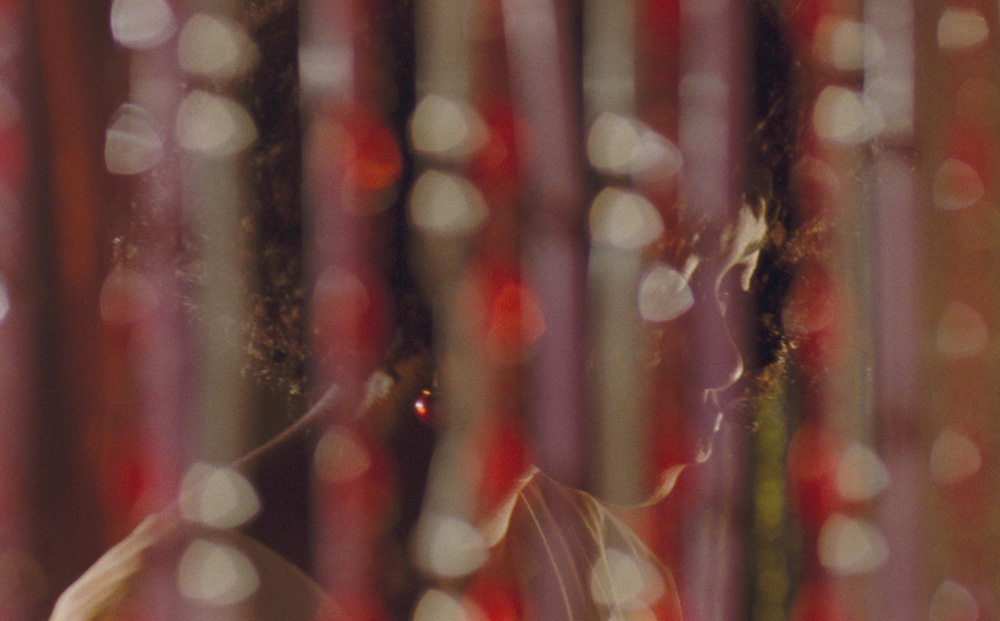As “Eyimofe (This is My Desire)” was making its North American debut at AFI Fest, Chuko Esiri, who co-directed the film with his brother Arie, had been hearing news that just outside his apartment in Lagos, peaceful protestors had been fired upon by the Nigerian army and police, leaving 12 dead after a demonstration against police brutality.
“Ironically enough, the very first screenplay I ever wrote was in 2011 and that had to deal with the police unit that we have been protesting for their disbandment,” says Esiri. “So it really doesn’t work and it hasn’t worked for a really long time. There’s a massive amount of oppression and when you have a place like this, it’s unsurprising that it pushes people out.”
Esiri had made the decision some time ago not only to stay in Lagos after finishing up film school in the U.S., but with Arie, tell local stories that bring out the beauty of the vibrant city while illuminating the challenges its citizenry faces when its infrastructure is so precarious. It shouldn’t come as a surprise then that “Eyimofe” opens with the seemingly mundane image of a tangle of wires on a circuit board that becomes far more powerful when you realize it’s the least complicated situation Mofe (Jude Akuwudike) is tasked with unraveling as the film wears on. As an engineer, Mofe’s services are required all over Lagos, from helping his nephew fix a paddle to play ping-pong to training other electricians at factories. But he is pulled away from work when tragedy strikes his sister and her two sons, leading him to put plans on hold to restart his life in Spain. Meanwhile, the Esiris offer a parallel storyline with Rosa (Temi Ami-Williams), who has similar aspirations of resettling in Italy after her teenage sister Grace (Cynthia Ebijie) becomes pregnant.
The paperwork both Mofe and Rosa encounter may be immediately frustrating, but the Esiris draw out greater cultural concerns than the governmental bureaucracy in Lagos where a societal hierarchy rooted in patriarchy and colonialism continues to rear its ugly head, as Rosa’s opportunities to ease her financial burdens involve cozying up to her landlord and American tourists beyond her work as a hairdresser and Mofe quite literally spars with his father, who has abandoned all responsibility for his children yet feels entitled to a significant piece of his daughter’s modest estate. Split into two halves, “Eyimofe” gives a panoramic view of the metropolis of 21 million while presenting the lives of the two it focuses on in all their dimension, from the lives they want to be leading to all the different directions they’re pulled in on a daily basis that prevent them from pursuing them, and as the film has been making its way around the world at virtual festivals, Arie and Chuko graciously took the time to connect from opposite ends of the earth to talk about how the ambitious project came together, being responsive to what was happening in the outside world as the script took shape and shooting in 48 districts in Lagos.
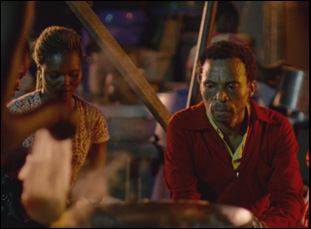
Chuko Esiri: It was the treatment for my film school application, so I actually went to film school with it and then I ended up coming back to it and writing it as my graduation piece, as my thesis.
Arie Esiri: Yeah, Chuko and I were both at separate film schools at the same time — I was uptown, he was downtown and we were sharing movies and we harbored the same dreams to make films. Over the course of the years, [when] he was working for creative agencies and exploring producing and writing, and me working on sets in the camera department, it became clear what our various strengths were and how we’d be able to merge them to make the types of films that mean something to us. We had already done a short film [together] whilst we were at school that Chuko wrote and it was just a great pleasure to do [co-direct]. It was like being in two places at once. So when Chuko started working on the script, which started about eight years ago, we were always working on each other’s things and giving each other notes. Usually, we’re the first point of call when we come up with an idea, so I was involved in the script in that way and then naturally, it became a thing where it’s like, “Yes, let’s direct it together.”
Over the last decade, the migrant crisis has really come to the fore. Did the script evolve with that in mind?
Chuko Esiri: Yeah, the idea of traveling has always been baked into the fabric of the screenplay, but what happened was it exploded — and [now] the pandemic has caused all sorts of trauma — but I’m pretty sure what’s happening with people leaving Africa and trying to get to Europe and other places is very much a pandemic that’s been happening for a very long time in great numbers. I was experiencing the narrative from the other side and worldwide, I think it had a knock-on effect where we saw this rising or resurgence of right-wing attitudes of “these migrants are coming to take advantage of our systems” and “they should go back to where they came from.” A lot of news around migration was very dehumanizing — it’s [images of] people in life vests drowning in the Mediterranean and in detention centers.
The films that were coming out at the time telling stories were also very much engaged with life when they get to Italy or England or the States, it’s about what happens when they leave. But for me, being a Nigerian and interacting with Nigerians every day, I felt what you’re seeing on television and what you’re hearing about migrants coming to steal jobs and take advantage is just not true. We really wanted to humanize the migrant crisis. We wanted to approach it from the other side so you get to see what’s pushing them out, so you get to see and experience them as human beings with families and loved ones and that you get to understand that when a person makes that decision to leave everything that they’ve known and everything they love for another place in order to better the lives of those they’ve left behind, it’s not an easy decision and it often includes some sacrifices. When I first had the idea for the film, I moved back to Nigeria to do my National Fleet service and I found myself for the very first time having to fully acquaint myself with the country, and having spent the majority of my life in England and in the States, it was difficult. My first instinct was “I need to get out of here.” But the longer I stayed on the ground, the more I reconnected with everything. I rediscovered my roots and fell in love with the place again.
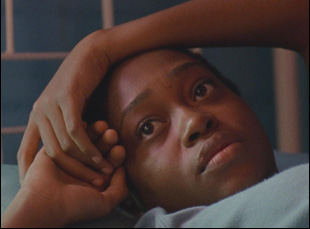
Arie Esiri: We were always in touch with Nigeria and always coming back. We were really abroad just for school, coming to [America] to get the training we couldn’t get at home and come back and make the movie, but it’s an interesting question. A lot of my approach to the film was conversations I’ve wanted to have about the city for a long time. There definitely was excitement that we were going to get the opportunity to shoot in Lagos and shoot in as many places as we were going to and that was one of the reasons why we were so adamant about keeping the locations that Chuko had written into the script, and in some cases, adding a few more.
Chuko Esiri: Yeah, living in Lagos and seeing all its wrinkles was a natural want, and there are two books I read at the time that had a massive, massive impact on the screenplay – the first was James Joyce’s “Dubliners,” which is one of my favorite books — I read it probably once a year, if you average it out – and in a letter to his brother, [Joyce] says he wants to “hold up a well-polished looking glass to the city, into its people.” That really resonated with me. Then I was reading Charles Dickens’ “Bleak House” and what Dickens is famous for is [being] a great chronicler of London and industrial England, but what he does so amazingly in that book is [detailing] the regions – if it’s the chancellory where the courts are or the slums or the countryside where the manors are, tthey’re so distinct and their effect on the characters is so evident. People are very much a product of their environment and all of that bled into the writing, so naturally the locations started popping up and it gave my brother and Melissa a minor heart attack.
Arie Esiri: It was something that I was very apprehensive about as I was reading the draft and I knew it was going to be a serious undertaking, but Lagos featuring in the film was always very important. My excitement for capturing the city existed as soon as I realized this is what I wanted to do – make films. I talk a lot about Chuko showing me “Bicycle Thieves,” which is like the beginning for me of this exploration of directing and moving away from the track I was on, which was to become a cinematographer. The moment I started seeing a lot of these neorealist films and Taiwanese new wave cinema, which [also] heavily influenced the film, I was excited about having a film that we shot in our hometown that can travel and share our experiences with people.
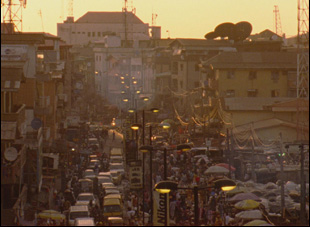
Arie Esiri: Our production designer Taisa Malouf, who is originally from Brazil, was really instrumental in some of the things you just mentioned, like the lawyer’s office and very specifically the beads that cascade on the front of Rosa’s door. Taissa had come to Lagos at least five weeks before we started shooting and visited a lot of people’s homes, and in some instances, traded new kettles for older ones and little bits of material and things to really give texture to some of the spaces we were shooting in. A lot of the other spaces that you see like the market and some of the outdoor spaces are real places, just real life happening in Lagos that we allowed to unfold in front of the camera and behind our scenes while the drama was taking place. But that was it really. We had a really wonderful city to draw on as far as textures and colors are concerned and setting up the camera to say something interesting was a very easy task.
I was intrigued to hear that Rosa’s half of the film actually wasn’t part of the original premise for the film — how did she make her way in?
Chuko Esiri: In the early versions, Rosa was very much a supporting character and [the stories] were much more connected, but in my last year at film school, it was the first year that Geena Davis had done her gender study at USC where they speak about representation of women, and one of my classmates sent it around the class. And I read it and I felt really quite guilty because I was like checking all the boxes I’m supposed to be checking with all the versions of the script, but [the treatment at the time] was a version where I really hadn’t done the character justice. So [Rosa’s storyline] really grew out of me challenging myself to be a better writer. As I started thinking more about that character, she just grew and grew to the point where it was like, “Oh you know what? She really deserves her own chapter.” It’s actually another avenue to say and point to these things that I’d been frankly been turning a bit of a blind eye to.
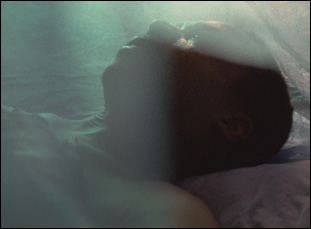
Chuko Esiri: Simply put, it’s a dream come true. Honestly, as mad as this year has been, I’m filled with gratitude and humility that we’ve been fortunate enough to have the film play in the places it’s played and have people react the way they’ve reacted. While all art can be quite lonely and one feels that they’re working in a bit of a vacuum, never knowing if it’s going to work or if you’re going to reach the people you want to reach, the fact that I mean even one person sees and appreciates it, it really does mean a lot. I can’t stress that enough how magnificent the whole experience has been, and honestly, just a massive amount of gratitude that it’s even a possibility.
“Eyimofe” opens on July 23rd in New York at Film Forum.




